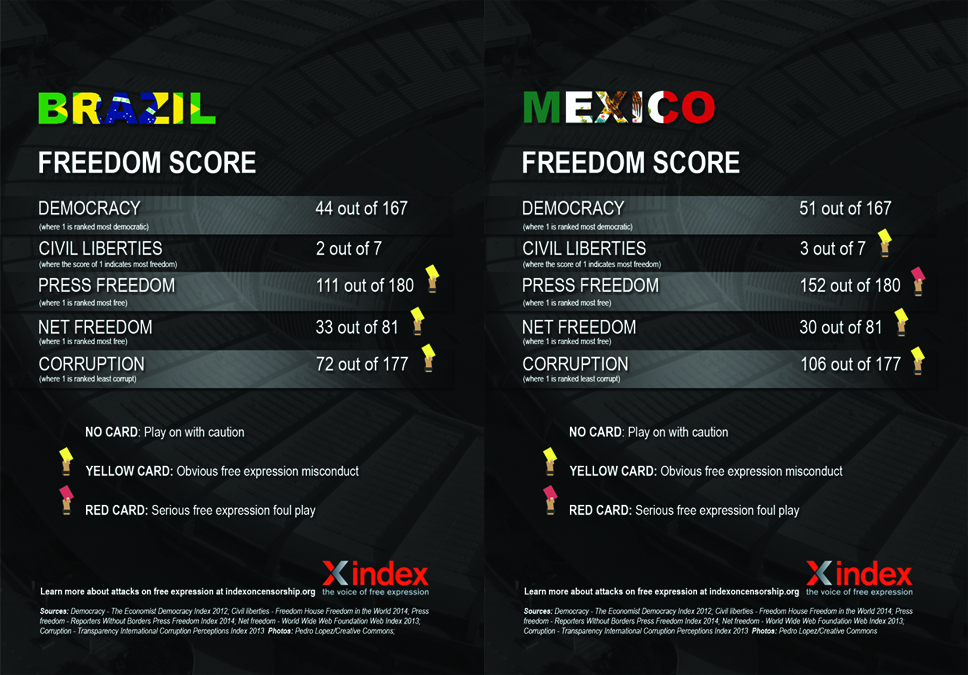Journalists in Mexico under threat from cartels, government and even each other
[vc_row][vc_column][vc_single_image image=”89329″ img_size=”full” add_caption=”yes” alignment=”center”][vc_custom_heading text=”Mexico-based journalist DUNCAN TUCKER writes in the spring 2017 issue on reporting in a country where news is not just repressed, it’s fabricated, and journalists face violent threats from police and cartels. ” google_fonts=”font_family:Libre%20Baskerville%3Aregular%2Citalic%2C700|font_style:400%20italic%3A400%3Aitalic”][/vc_column][/vc_row][vc_row][vc_column][vc_column_text]
“I hope the government doesn’t give in to the authoritarian temptation to block internet coverage and start arresting activists,” Mexican blogger and activist Alberto Escorcia told Index on Censorship magazine.
Escorcia had just received a series of threats for writing an article about recent unrest in the country. The next day the threats against him intensified. Feeling trapped and unprotected, he began making plans to flee the country.
Many people are concerned about the state of freedom of expression in Mexico. A stagnant economy, a currency in freefall, a bloody drug war with no end in sight, a deeply unpopular president at home and the belligerent Donald Trump administration freshly installed in the USA across the border, these forces are all creating a squeeze in 2017.
One of the biggest tensions is Mexico’s own president. Enrique Peña Nieto’s four years in office have brought sluggish economic growth. There has also been resurgent violence and a string of corruption scandals. In January this year his approval ratings plummeted to 12%.
But when journalists have tried to report on the president and his policies they have come under fire. For example, 2017 began with intense protests after Peña Nieto announced a 20% hike in petrol prices. Days of demonstrations, blockades, looting and confrontations with police left at least six people dead and more than 1,500 arrested. The Committee to Protect Journalists reported that police beat, threatened or briefly detained at least 19 reporters, who were covering the unrest in the northern states of Coahuila and Baja California.
News was not just suppressed, it was fabricated. Mass hysteria enveloped Mexico City as legions of Twitter bots incited violence and spread false reports of further looting, causing the temporary closure of 20,000 small businesses.
“I’ve never seen Mexico City like this,” Escorcia said over the phone from his home in the capital. “There are more police than normal. There are helicopters flying above us every hour and you can hear sirens constantly. Even though there hasn’t been any looting in this part of the city, people think it’s happening everywhere.”
[/vc_column_text][/vc_column][/vc_row][vc_row][vc_column][vc_column_text]
Duncan Tucker is a freelance journalist, based in Guadalajara, Mexico. The rest of this article is available online here. This article is part of a series in the spring 2017 issue of Index on Censorship magazine that looks at situations where free speech is being restricted from multiple sides. You can read about all of the other content in the magazine here.
[/vc_column_text][/vc_column][/vc_row][vc_row][vc_column][vc_custom_heading text=”From the Archives”][vc_row_inner][vc_column_inner width=”1/3″][vc_single_image image=”89160″ img_size=”213×300″ alignment=”center” onclick=”custom_link” link=”http://journals.sagepub.com/doi/pdf/10.1177/0306422011399687″][vc_custom_heading text=”Narco tales” font_container=”tag:p|font_size:24|text_align:left” link=”url:http%3A%2F%2Fjournals.sagepub.com%2Fdoi%2Fpdf%2F10.1177%2F0306422011399687|||”][vc_column_text]March 2011
Bloggers and citizen journalists are telling the stories that the mainstream Mexican media no longer dares to report, says Ana Arana.[/vc_column_text][/vc_column_inner][vc_column_inner width=”1/3″][vc_single_image image=”89168″ img_size=”213×300″ alignment=”center” onclick=”custom_link” link=”http://journals.sagepub.com/doi/pdf/10.1080/03064220902734319″][vc_custom_heading text=”Wall of silence” font_container=”tag:p|font_size:24|text_align:left” link=”url:http%3A%2F%2Fjournals.sagepub.com%2Fdoi%2Fpdf%2F10.1080%2F03064220902734319|||”][vc_column_text]February 2009
Analysis of the culture of intimidation facing investigative journalists in Mexico — from attacks on reporters to criminal activity.[/vc_column_text][/vc_column_inner][vc_column_inner width=”1/3″][vc_single_image image=”94760″ img_size=”213×300″ alignment=”center” onclick=”custom_link” link=”http://journals.sagepub.com/doi/pdf/10.1080/03064227608532576″][vc_custom_heading text=”Guessing game” font_container=”tag:p|font_size:24|text_align:left” link=”url:http%3A%2F%2Fjournals.sagepub.com%2Fdoi%2Fpdf%2F10.1080%2F03064227608532576|||”][vc_column_text]April 1983
The unpredictability of Mexican government crackdown keeps the press guessing, making them careful with what they publish. [/vc_column_text][/vc_column_inner][/vc_row_inner][vc_separator][/vc_column][/vc_row][vc_row][vc_column width=”1/3″][vc_custom_heading text=”The Big Squeeze” font_container=”tag:p|font_size:24|text_align:left” link=”url:https%3A%2F%2Fwww.indexoncensorship.org%2Fmagazine|||”][vc_column_text]The spring 2017 issue of Index on Censorship magazine looks at multi-directional squeezes on freedom of speech around the world.
Also in the issue: newly translated fiction from Karim Miské, columns from Spitting Image creator Roger Law and former UK attorney general Dominic Grieve, and a special focus on Poland.[/vc_column_text][/vc_column][vc_column width=”1/3″][vc_single_image image=”88788″ img_size=”medium” alignment=”center” onclick=”custom_link” link=”https://www.indexoncensorship.org/magazine”][/vc_column][vc_column width=”1/3″][vc_custom_heading text=”Subscribe” font_container=”tag:p|font_size:24|text_align:left” link=”url:https%3A%2F%2Fwww.indexoncensorship.org%2Fsubscribe%2F|||”][vc_column_text]In print, online. In your mailbox, on your iPad.
Subscription options from £18 or just £1.49 in the App Store for a digital issue.
Every subscriber helps support Index on Censorship’s projects around the world.
![]() SUBSCRIBE NOW[/vc_column_text][/vc_column][/vc_row]
SUBSCRIBE NOW[/vc_column_text][/vc_column][/vc_row]



